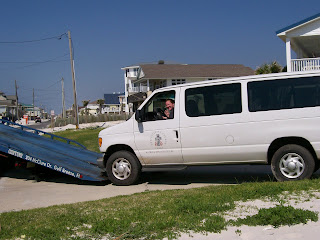


This is being sent on behalf of Donna Gambrell, Regional Director for the Office of the Federal Coordinator for Gulf Coast Rebuilding…
Office of the Federal Coordinator for Gulf Coast Rebuilding
THURSDAY, APRIL 26, 2007—11:15AM
Contacts:
GCR/Susan Aspey, (202) 572-8994 or (202) 577-9359
HUD/Donna White, (202) 708-0685
FEMA News Desk, (202) 646-4600
Housing assistance extended for GULF COAST hurricane victims
FOR ANOTHER 18 months
WASHINGTON – Federal Coordinator for Gulf Coast Rebuilding Donald E. Powell, U.S. Department of Housing and Urban Development Secretary Alphonso Jackson and FEMA Administrator R. David Paulison announced today that the temporary housing assistance programs for Gulf Coast hurricane victims have been extended by 18 months until March 1, 2009. The current FEMA extension ends on August 31, 2007.
HUD and FEMA are also working on a plan whereby HUD would take over management of the rental housing program on behalf of FEMA beginning on September 1, 2007. GCR, HUD and FEMA are working on the mechanics of the new arrangement and will consult with Congress on the most appropriate structure for transferring management responsibilities.
Beginning in March 2008, individuals in both the rental housing and travel trailer and mobile home programs will pay a portion of the cost, which will begin at $50 per month and incrementally increase each month thereafter until the program concludes on March 1, 2009. In addition, beginning immediately, FEMA will allow residents of its mobile homes and travel trailers to purchase their dwellings at a fair and equitable price. Seniors and the disabled whose primary source of income is Supplemental Security Income (SSI) or other fixed income that make them eligible to receive assistance under existing HUD programs will be protected. HUD will actively work to transition these individuals into its properties or programs for seniors and the disabled.
“We understand the importance of minimizing uncertainty for Gulf Coast residents who have endured this unprecedented tragedy,” Powell said. “This coordinated, 18-month extension will provide stability to residents while providing effective incentives and assistance to help them transition into long-term housing solutions.”
“The overwhelming scale of this human tragedy has meant that families have been displaced for an unprecedented period of time. Such a reality calls for an unprecedented, compassionate response,” said Secretary Jackson. “As disaster housing needs continue and move into a longer-term program, HUD is working to ensure the affected families will continue to get the housing assistance they need as well as the individual services that will help them rebuild their lives.”
“This extension allows FEMA and our partners to be responsive in developing innovative, flexible and compassionate solutions to help disaster victims get back on their feet,” said Administrator Paulison. “While we are proud of the tremendous progress we’ve made, we won’t be satisfied until every disaster victim has successfully navigated the road to recovery.”
Under the proposed parameters of the FEMA-HUD Disaster Housing Assistance Program (DHAP), local public housing agencies (PHAs) would administer the program under Stafford Act authority. FEMA would provide resources to HUD to extend rental assistance to up to 40,000 hurricane-affected families who are already living in rental units paid for by FEMA. Families are expected to experience a seamless transition under the new program.
DHAP would provide much-needed stability to individuals and families affected by the storms, and would lengthen the potential for some to receive housing assistance for up to three-and-a-half years following the 2005 storm season. In addition to housing assistance being made available, under the proposed program, PHAs would also work with individuals and families under this new program to provide access to job training, housing counseling and other forms of support that would better enable disaster victims to regain independence and self-sufficiency.
Between now and September 1, 2007, FEMA plans to provide HUD with a list of its current renters so that HUD can assume their rental assistance. Under the proposed program, beginning on March 1, 2008, HUD would use a transitional approach to help families continue along the path to self-sufficiency. For example, starting on that date, the level of assistance would be reduced by $50 per month successively, with the goal of leading the family closer to complete housing independence at the end of the 18-month extension. For example, if a family has an $850 rental apartment, they would be required to contribute $50 toward their rent starting in March 2008, which would rise to $100 in April 2008; $150 in May 2008, etc. In addition, beginning on March 1, 2008, families in FEMA travel trailers and mobile homes would begin to pay a share of the monthly costs, which will also incrementally increase until the program reaches its conclusion on March 1, 2009.
To the extent allowable by law, seniors and the disabled who qualify would continue to receive the full subsidy required to pay their rent (either in an apartment or in travel trailers and mobile homes) throughout the duration of the extended 18-month program.
HUD plans to continue to work closely with local PHAs nationwide to administer the new DHAP vouchers. These PHAs also administer HUD’s regular Housing Choice Voucher Program (Section 8), which gives them the business knowledge required to manage this new program, and will allow for a smooth transition for families. PHAs also have the necessary expertise in working directly with families with sensitive needs, which puts them in a better position to coordinate extensive case management to address each family’s specific goals—be it job training, financial education and other valuable services that help lead these families to self-sufficiency.
FEMA will continue to manage its mobile home and travel trailer operations throughout the Gulf, and also will continue to engage HUD, as well as state and local officials, on a collaborative effort to identify alternative housing solutions for those in mobile home and travel trailer residents. As with the HUD program, beginning on March 1, 2008, individuals in the trailers and mobile homes will pay a small portion of the cost, beginning at $50 per month; FEMA will increase the amount of rent charged incrementally on the travel trailers and mobile homes until the family reaches its ability to pay, according to a FEMA formula based on income.
Beginning immediately, FEMA is setting up a process to allow victims of Katrina and Rita who have been living in travel trailers and mobile homes to purchase those units at a reduced cost. The adjusted fair market cost will take into account FEMA’s monthly expenses for maintaining the units and its standard cost for deactivating the units. This initiative will allow those residents who have been unable to move on to purchase their own units, thus facilitating their return to self-sufficiency.
###
The Office of the Federal Coordinator for Gulf Coast Rebuilding coordinates the Federal rebuilding efforts by working with state and local officials to focus on a set of prioritized, integrated and long-term initiatives to rebuild the region.
FEMA coordinates the federal government’s role in preparing for, preventing, mitigating the effects of, responding to, and recovering from all domestic disasters, whether natural or man-made, including acts of terror.
HUD is the nation's housing agency committed to increasing homeownership, particularly among minorities; creating affordable housing opportunities for low-income Americans; and supporting the homeless, elderly, people with disabilities and people living with AIDS. The Department also promotes economic and community development, and enforces the nation’s fair housing laws. More information about HUD and its programs is available on the Internet at http://www.hud.gov/ and espanol.hud.gov.
































